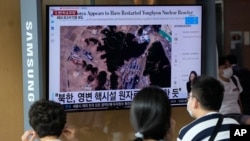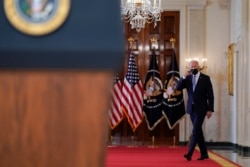Experts say North Korea’s reactivation of the reactor at its Yongbyon nuclear facility may be a calculated step by Pyongyang to gain leverage in a renewed effort to gain concessions from the U.S.
North Korea resumed the operation of a nuclear reactor at Yongbyon in early July, according to the annual report released by the International Atomic Energy Agency (IAEA) on Friday. The reactor, capable of producing plutonium to make nuclear weapons, had been dormant from early December 2018.
Former President Donald Trump rejected an offer by regime leader Kim Jong Un to dismantle the Yongbyon site in exchange for sanctions relief when the two met in Hanoi in February 2019. The summit collapsed because Trump wanted Pyongyang to shut down all its nuclear facilities, a move Kim refused to make.
Experts told VOA Korean that the timing of the Yongbyon reactor’s July reactivation may be a test of the Biden administration as it coincided with the beginning of troop withdrawals from Afghanistan, a process that concluded on Monday.
Evans Revere, a former State Department official who has an extensive experience dealing with North Korea, said, “We cannot rule out that the resumption of plutonium production and reprocessing [reactor] at Yongbyon is Pyongyang’s way of reminding the United States of the dangers posed by the nuclear facilities at Yongbyon in order to see what ‘price’ the United States might be willing to pay to freeze or shut down these facilities if negotiations resume.”
David Maxwell, a senior fellow at the Foundation for Defense of Democracies, said restarting the reactor is North Korea’s attempt at “using threats and increased tensions to try to drive the U.S. to dialogue to obtain concessions of sanctions relief.”
Maxwell continued to say, “Kim may assess that the Biden administration needs some kind of foreign policy success and may really want to show progress on North Korea.”
Gary Samore, former White House coordinator for Arms Control and Weapons of Mass Destruction during the Obama administration, said Pyongyang is trying to enhance its leverage with Washington in future negotiations.
“Starting up the five-megawatt reactor gives North Korea more leverage, gives the U.S. more incentive to accept North Korea’s proposal,” Samore said.
Samore added, “At the end of the day, of course, if the two sides can’t come to an agreement, North Korea can always use the extra plutonium for its nuclear weapons program. So the decision to restart the reactor serves both a diplomatic purpose in terms of enhancing North Korean leverage, and also serves a technical purpose in terms of providing more material for its nuclear weapons.”
President Joe Biden has been dealing with the aftermath of its troop withdrawal in Afghanistan since mid-August as the Taliban moved with unanticipated speed to occupy the nation and its capital, Kabul, with little resistance.
Revere said that Pyongyang may increase its military provocations in an attempt to exploit what it sees as a weakened U.S. position.
Revere said, “North Korea may be tempted to view the United States as weak or irresolute in the aftermath of the end of the U.S. military presence in Afghanistan, and this in turn could lead to military adventurism by North Korea.”
Experts, however, do not believe North Korea will make threats that would overstep the U.S. refusal to accept testing intercontinental ballistic missiles (ICBM) or nuclear weapons.
“An ICBM or nuclear weapons test would push the United States into increasing sanctions pressure on North Korea and make it very difficult for China to push back against the existing U.S. and United Nations sanctions, which are not outcomes that North Korea wants,” said Bruce Bennett, a senior defense analyst at the RAND Corp.
China helps North Korea evade sanctions, particularly with coal exports and petroleum imports, according to the United Nations.
Kim announced in December 2019 that North Korea was ending its self-imposed moratorium on testing long-range missiles and nuclear weapons and demanded concessions from the U.S. Nevertheless, the regime so far has not tested either.
Maxwell said North Korea is likely to raise provocations by carrying out “major mobilization activities” of its conventional military force such as artillery and rocket forces trainings, heightened air defense training, movement of special operation forces and naval vessels, and increased activity along the demilitarized zone (DMZ) separating the two Koreas.
“We will see activities that we can assess as preparations for a possible major attack,” Maxwell said. “This will be somewhat ambiguous because it can be assessed as a major training exercises.”
Talks between Pyongyang and Washington remain largely deadlocked, despite the Biden administration’s attempts to reengage North Korea.
U.S. Special Representative for North Korea Sung Kim met with South Korea’s top nuclear envoy, Noh Kyu-duk, who visited Washington D.C. this week. On Monday, the two discussed ways to bring North Korea to the negotiating table. Kim said he is waiting for a reply from North Korea on the U.S. offer for talks.






